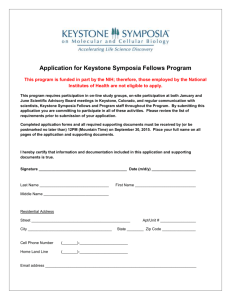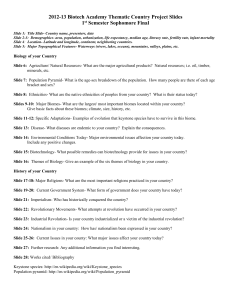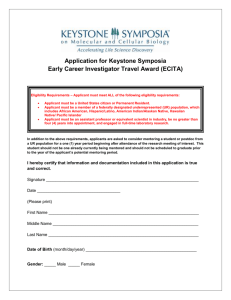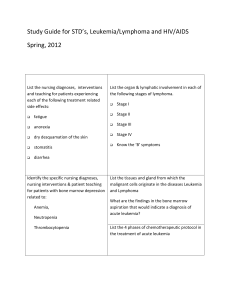For Immediate Release Yvonne M. Psaila Director of Marketing
advertisement
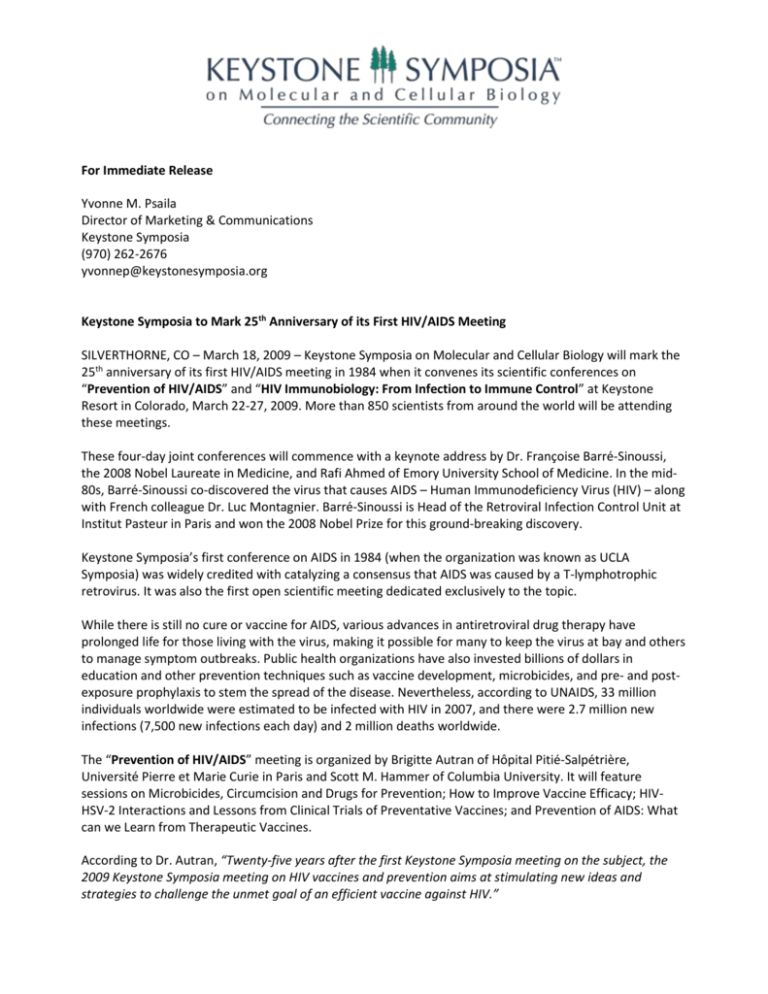
For Immediate Release Yvonne M. Psaila Director of Marketing & Communications Keystone Symposia (970) 262-2676 yvonnep@keystonesymposia.org Keystone Symposia to Mark 25th Anniversary of its First HIV/AIDS Meeting SILVERTHORNE, CO – March 18, 2009 – Keystone Symposia on Molecular and Cellular Biology will mark the 25th anniversary of its first HIV/AIDS meeting in 1984 when it convenes its scientific conferences on “Prevention of HIV/AIDS” and “HIV Immunobiology: From Infection to Immune Control” at Keystone Resort in Colorado, March 22-27, 2009. More than 850 scientists from around the world will be attending these meetings. These four-day joint conferences will commence with a keynote address by Dr. Françoise Barré-Sinoussi, the 2008 Nobel Laureate in Medicine, and Rafi Ahmed of Emory University School of Medicine. In the mid80s, Barré-Sinoussi co-discovered the virus that causes AIDS – Human Immunodeficiency Virus (HIV) – along with French colleague Dr. Luc Montagnier. Barré-Sinoussi is Head of the Retroviral Infection Control Unit at Institut Pasteur in Paris and won the 2008 Nobel Prize for this ground-breaking discovery. Keystone Symposia’s first conference on AIDS in 1984 (when the organization was known as UCLA Symposia) was widely credited with catalyzing a consensus that AIDS was caused by a T-lymphotrophic retrovirus. It was also the first open scientific meeting dedicated exclusively to the topic. While there is still no cure or vaccine for AIDS, various advances in antiretroviral drug therapy have prolonged life for those living with the virus, making it possible for many to keep the virus at bay and others to manage symptom outbreaks. Public health organizations have also invested billions of dollars in education and other prevention techniques such as vaccine development, microbicides, and pre- and postexposure prophylaxis to stem the spread of the disease. Nevertheless, according to UNAIDS, 33 million individuals worldwide were estimated to be infected with HIV in 2007, and there were 2.7 million new infections (7,500 new infections each day) and 2 million deaths worldwide. The “Prevention of HIV/AIDS” meeting is organized by Brigitte Autran of Hôpital Pitié-Salpétrière, Université Pierre et Marie Curie in Paris and Scott M. Hammer of Columbia University. It will feature sessions on Microbicides, Circumcision and Drugs for Prevention; How to Improve Vaccine Efficacy; HIVHSV-2 Interactions and Lessons from Clinical Trials of Preventative Vaccines; and Prevention of AIDS: What can we Learn from Therapeutic Vaccines. According to Dr. Autran, “Twenty-five years after the first Keystone Symposia meeting on the subject, the 2009 Keystone Symposia meeting on HIV vaccines and prevention aims at stimulating new ideas and strategies to challenge the unmet goal of an efficient vaccine against HIV.” The “HIV Immunobiology” meeting is organized by Didier Trono (École Polytechnique Fédérale de Lausanne), Dana H. Gabuzda (Dana-Farber Cancer Institute), and Robert F. Siliciano (Johns Hopkins School of Medicine). Its core sessions will include Hiding from Immunity: Reservoirs and Latency; Models of HIV Immunobiology; New Insights in HIV Replication; Innate Antiviral Immunity; and Virus Spread. There will additionally be joint sessions shared by the two meetings on Host Genomics and HIV Disease; Immune Control of HIV and Virus Escape; and HIV at the Mucosa: Portal of Entry and Front-Line Defense. The conferences are part of the Keystone Symposia Global Health Series, which is supported by the Bill & Melinda Gates Foundation. As part of this support, the foundation has funded 85 Keystone Symposia Global Health Travel Awards. These make it possible for scientists, postdoctoral scholars, and students from countries where the disease is especially prevalent to travel to the conference. In addition to these awards, IAVI (International AIDS Vaccine Initiative) funded four Global Health Travel Awards. In all, the winners will be coming to Keystone Resort from 46 countries, and, for many, it will be their first visit to the United States. The interaction of those working on this major public health issue from so many regions of the world allows for an unprecedented level of global cooperation and transparency in moving towards new solutions. In 2010, Keystone Symposia’s traditionally joint annual HIV/AIDS meetings on Prevention and Pathology will follow a slightly different format. There will be a meeting entitled “HIV Biology and Pathogenesis” in Santa Fe, New Mexico in January, followed by joint meetings on “HIV Vaccines” and “Viral Immunology” in Banff, Alberta, Canada in March. Since an HIV vaccine is proving to be a particularly recalcitrant problem, the goal is to bring together virologists studying many other diseases and thereby facilitate a wider crossfertilization of ideas. This is in keeping with Keystone Symposia’s mission of mixing topics that are not always discussed together in novel ways, so as to stimulate new ideas and debate. In addition to the January and March 2010 meetings, there will be an October 2009 Keystone Symposia conference entitled “Overcoming the Crisis of TB and AIDS,” which will specifically address the growing incidence of co-infection of these two potentially fatal diseases. Organized by Anne E. Goldfeld of Harvard Medical School and Stefan H.E. Kaufmann of Max Planck Institute for Infection Biology-Berlin, the meeting is also part of the Keystone Symposia Global Health Series. It is tentatively scheduled for October 20-25, 2009 in Arusha, Tanzania. The deadline for those from affected countries to apply for Global Health Travel Awards is May 19, 2009. About Keystone Symposia Keystone Symposia on Molecular and Cellular Biology, a 501(c)3 non-profit organization, has been conducting internationally renowned, open scientific conferences since 1972 and has been headquartered in Summit County, Colorado since 1990, when the organization left the University of California at Los Angeles. Annually, Keystone Symposia holds more than 50 meetings involving more than 13,000 scientists from around the world. Most of the meetings are held in the Rocky Mountain U.S. states and Canadian provinces, with a few each year now scheduled for overseas. Conferences are typically three to four full days in length. Registration fees are supplemented by generous monetary support from corporate, foundation, and individual donors as well as government grants. The organization is advised by an allvolunteer Board of Directors and a Scientific Advisory Board comprised of leading scientists from around the world. More information on Keystone Symposia can be found at www.keystonesymposia.org. Details on the Prevention of HIV/AIDS and HIV Immunobiology meetings are available at www.keystonesymposia.org/9X3 and www.keystonesymposia.org/9X4, respectively. Information on the fall 2009 meeting on Overcoming the Crisis of TB and AIDS can be found at www.keystonesymposia.org/9T2.
